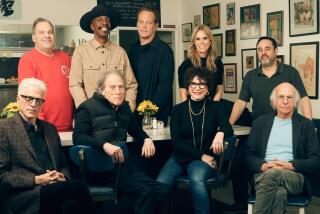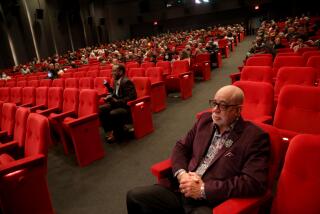Comic Salve for Thin Skins
- Share via
The Rev. Jesse Jackson and the Rev. Al Sharpton need to get out more--maybe even break down and catch a matinee of “Barbershop,” the movie that has Jackson demanding apologies and Sharpton threatening boycotts. Anyone who takes himself so seriously could use a good laugh.
Produced, directed and written by African Americans and with a virtually all-black cast (the one white character wants to be black), the movie is a reworked classic--”It’s a Wonderful Life” set in a rough Southside Chicago neighborhood.
Just as Jimmy Stewart’s George Bailey felt trapped into taking over his father’s bank, Ice Cube’s Calvin Palmer wants to be a music producer, not a barber--until he realizes how lucky he has it and how important the barbershop is to the community.
The fun is in how he comes to that epiphany. The 2002 version is more salty and less saccharine (sorry, Frank Capra fans) than the 1946 one.
The singular two-minute scene that sent Jackson and Sharpton into orbit cast comedian Cedric the Entertainer as Eddie, an old-timer who never seems to actually cut anyone’s hair. The irascible Eddie pokes fun at several African American public figures, including O.J. Simpson and Rodney King. No one escapes his sharp tongue, not even civil rights icons Rosa Parks, Martin Luther King Jr. or Jackson himself. Never mind that the character is meant to be over the top and that a dozen other folks in the barbershop tell him so. Thin skin comes in all shades.
Jackson and Sharpton, joined by members of the King family and friends of Parks, want a public apology by Friday and the scene excised when MGM releases the movie on video.
Oh, please. Even if this protest didn’t take the lines out of context, the movie makers would still have the right to use them, just as Jackson and Sharpton have the right to object. Comedy doesn’t have sacred cows, and free speech is protected in studios and barbershops alike.
Look, it’s no surprise that groups--especially those who have suffered due to bigotry, discrimination and stereotypes--want to control how they are seen and portrayed. This year, an unflinching documentary about gay Orthodox Jews caused an uproar in the Jewish community.
A movie that “lets the world eavesdrop on the conversation that black folks can have when white people aren’t around,” as one critic (admiringly) described “Barbershop,” breaks these rules.
The good news is that the new, post-civil rights generation may not need the old rules. The multiracial crowds who are making this bighearted movie a box office hit may not yet be colorblind, but they all laugh at the same jokes and come away with the same, surprisingly sweet lesson about the importance of community.
They simply recognize a wonderful movie when they see one, and so might Jackson and Sharpton if they’d just join the audience and not be so desperate to draw one.
More to Read
Only good movies
Get the Indie Focus newsletter, Mark Olsen's weekly guide to the world of cinema.
You may occasionally receive promotional content from the Los Angeles Times.










